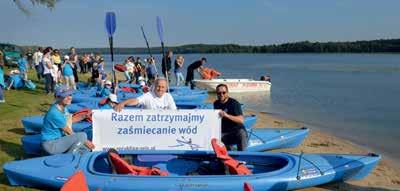
3 minute read
Circular Economy
2018 saw the continuation of the European Union legislative offensive related to the circular economy project. The Plastics Strategy published by the European Commission in January highlights certain aspects of the role of plastics within the circular economy, in particular the need for higher plastics circularity and a decrease in plastic waste littering. The Strategy states that by 2030 all plastic packaging should be suitable for reuse or recycling, and that recycling should reach at least 55% of consumer plastic packaging waste introduced into the European market. The importance of plastic packaging design which allows for the highest rates of recycling was also emphasized. Separate collection was recognized as a key factor in obtaining an appropriate amount of raw material for recycling, and stress was also laid on the need to increase the demand for recycled plastics. In the context of plastic waste in the marine environment, the introduction of a directive on limiting the environmental impact of certain plastic products (the so-called Single-Use Plastics Directive) has been announced. The authors of the Strategy also emphasized the significance of proper functioning of the Extended Producer Responsibility (EPR) system and the need for the constant development of innovative solutions and new investments in more efficient waste management and the recovery of raw materials. Published in May 2019, after a very fast legislative process, the Single-Use Plastics Directive bans the use of certain single-use plastic products (e.g., straws, plates, cutlery, certain products made of EPS) and imposes on Member States the need to introduce programs aimed at the reduction of certain other products (cups, food packaging).
During this entire process of intensified plastics-related legislative action, the Foundation, like the entire plastics industry value chain, has drawn attention to the drawbacks of the legislative process. It has noted, for example that the preparation of and voting on the projects was too rapid and that wide consultation with stakeholders was lacking, especially with regard to the Single-Use Plastics Directive, but also that there was no holistic approach to, or comprehensive impact assessment of a legal act, potentially risking the distortion of the EU single market. PlasticsEurope Polska’s advocacy activities focused on cooperation with the government and dialog with legislators. The most frequently discussed topics included the Plastics Strategy and the draft of Single-Use Plastics directive; microplastic waste in the marine environment; and the incorporation of the circular economy package into Polish law, including the amendment to the waste law. The PlasticsEurope Polska Foundation engaged in dialog not only with the government, but also with the waste
Advertisement
Plastics 2030
www.plasticseurope.org
management industry and other branches of the industry, emphasizing the huge role of plastics in the economical use of resources, including the positive impact of plastic packaging on food waste reduction. As part of a broader dialog with society, representatives of the Foundation also presented (in press articles, and radio and television interviews) activities which the plastics industry has
undertaken aimed at using more sustainable plastics, and introducing plastic waste management practices which allow the potential offered by these materials to be fully exploited by recycling or energy recovery. The Foundation also widely circulated the assumptions of the “Plastics 2030 – PlasticsEurope’s Voluntary Commitment to increasing circularity and resource efficiency” initiative that was published in January 2018 as a response by the plastics industry to the European Plastics Strategy. “Plastics 2030” is a set of voluntary commitments that are to constitute the industry’s contribution to the implementation of the idea of the circular economy and economical resource management in Europe. The industry’s ambition is to reach the level of 60% of reuse and recycling of plastic packaging by 2030 and 100% of reuse, recycling, and recovery of all plastic
packaging waste by 2040. Three product platforms are provided to facilitate these goals: vinyl products (Vinyl Circular Solutions), PCEP polyolefin products (Polyolefin Circular Economy Platform), and SCS styrene products (Styrenics Circular Solutions). As part of Plastics 2030 an important declaration was made concerning the prevention of leakage of plastic pellets by means of the Operation Clean Sweep ® program that will engage all participants in the plastics value chain, from producers of polymers through the entire transport and logistics network to plastics converters who produce the products that reach the market.









